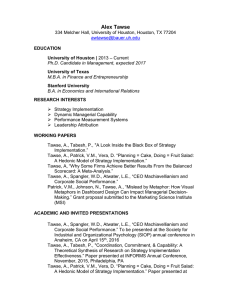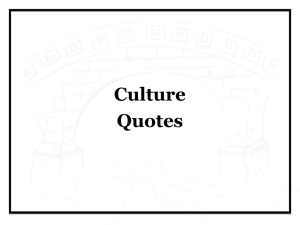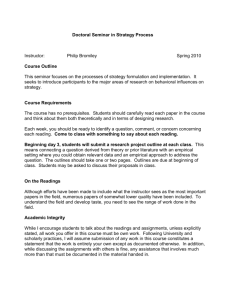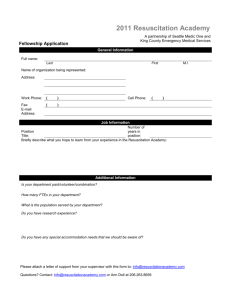The ABCDs of Leadership in OHNS
advertisement
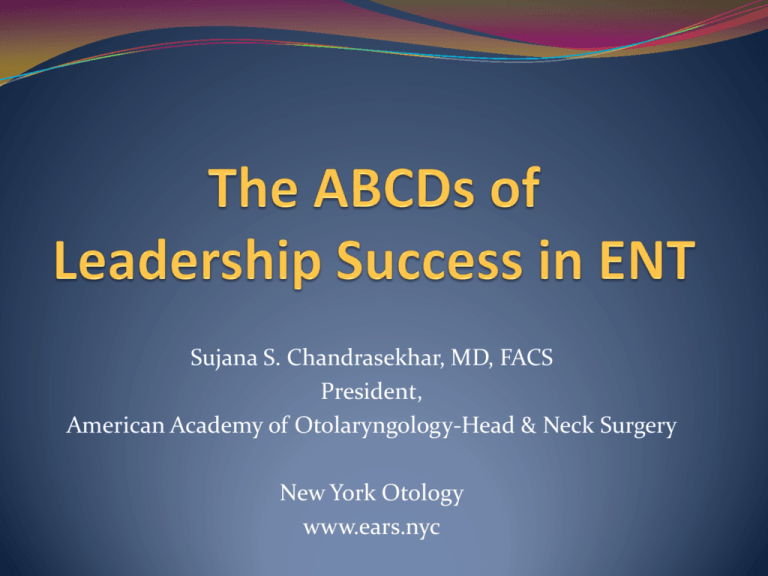
Sujana S. Chandrasekhar, MD, FACS President, American Academy of Otolaryngology-Head & Neck Surgery New York Otology www.ears.nyc DISCLOSURES No pertinent disclosures Many of the quotes in this talk come from ‘Inspiring Quotes’ selected by several of the 60 authors in this book. Why add Leadership? Leaders think and talk about the solutions; Followers think and talk about the problems. -Brian Tracy What is Leadership? Leadership is the process of influencing people and providing an environment for them to achieve team or organizational objectives. Leaders come in all shapes/sizes/styles. An effective leader: Creates an inspiring vision of the future. Motivates and inspires people to engage with that vision. Manages delivery of the vision. Coaches and builds a team, so that it is more effective at achieving the vision. Leadership is the art of getting someone else to do something you want done because he wants to do it.– Dwight D. Eisenhower Who are Leaders? Fortune – World’s 50 Greatest Leaders: 1. Tim Cook, CEO, Apple 2. Mario Draghi, President, European Central Bank 3. Xi Jinping, President, People’s Republic of China 4. Pope Francis 5. Narendra Modi, Prime Minister, India 6. Taylor Swift, Pop Star 7. Joanne Liu, Intnl President, Medecin Sans Frontieires 8. John Roberts, Jr, Chief Justice, US Supreme Court 9. Mary Barra, CEO, General Motors 10. Joshua Wong, Activist, Hong Kong Pro-Democracy Movement 11. Johnetta Elzie & DeRay McKessen, Non-violent Protestors, Ferguson, MO 18. Bill & Melinda Gates, Gates Foundation 19. Pete Frates, Advocate, ALS “Ice Bucket Challenge” 23. Elon Musk, CEO, Tesla and SpaceX 25. Mark Zuckerberg, CEO, Facebook 32. Mark Bertolini, CEO, Aetna 39. Anthony Fauci, Director, NIAH, NIH 42. Richard Pazdur, Director, FDA Heme/Onc Products Leaders in Otolaryngology Panel: The Impaired Physician – Trio Meeting, Jan 2016 Thoughtful Knowledgeable Compassionate Charismatic Principled Types of Leaders Leader by the position achieved Leader by personality, charisma Leader by moral example Leader by power held Intellectual leader Leader because of ability to accomplish things All effective leaders are: - self-aware - able to change - lifelong learners. Managers vs. Leaders MANAGERS • Focus on things • Do things right • Plan • Organize • Direct • Control • Follow the rules LEADERS • Focus on people • Do the right things • Inspire • Influence • Motivate • Build • Shape entities Managers vs. Leaders MANAGERS • Focus on things • Do things right • Plan • Organize • Direct • Control • Follow the rules Managers vs. Leaders LEADERS • Focus on people • Do the right things • Inspire • Influence • Motivate • Build • Shape entities Six Leadership Competencies Accepts chaos Shares information Develops relationships Embraces vision Acts with authenticity Demonstrates ethical sensibility ISN’T AFRAID TO STAND OUT How Do You Become a Leader? It’s often fortuitous Right place/right time Realize that’s what you like 1 year, 5 year, lifetime goals “Happiness” is not a goal – it is the byproduct of a life welllived. (Eleanor Roosevelt) Seek mentors/counselors Look at yourself critically Make sure you’re tough enough Make sure your family is on board Be prepared for disappointments Otolaryngology Attend meetings Speak up! Volunteer! Apply for committees/ taskforces Ask older (0r younger) members for guidance and recommendations Do journal reviews Write articles Mentor others up Leaders don’t make others into followers; they make them into other leaders Four Essential Pillars of Leadership What Sets a Physician Leader Apart from Other Leaders? EDUCATION CLINICAL RESEARCH PEOPLE/ RELATIONSHIPS My Story Immigrated to the US at age 5 Mom’s fellowship in adolescent medicine at Children’s of the DC Parents had to re-do residencies – Peds and ENT – at NYU 6 year combined BS-MD program – so I was an MD at age 22 Interviewed for Otolaryngology residency spots in 1985 Most places didn’t take women Others had only 1 spot potentially available for ‘other’ Did residency at NYU – 1986-1992 2 years of General Surgery “I’ve been trying to make you cry for 3 months” ‘Trauma Mama’ 4 years of Otolaryngology What’s a nice girl like me doing in a profession like this? 1st Academy meeting was Sept 1988 Interviewed for Neurotology fellowships – I was still me. Got married in July 1992 Started House Otol/Neurotol fellowship in Jan 1993 in LA Found mentors at HEC/HEI: ADC, JLS, JWH, DEB, MJD First job – New Jersey Medical School Surfactant and SSNHL research Mentored students, residents, post-docs Started the CI Program of NJ 3 kids Promoted up to Assoc Prof despite “you’ve been on maternity leave” Wrote a seminal paper on SSNHL during that particular maternity leave Attended first BOG meeting “You’re the little lady who applied for the most committees” Second job – Mount Sinai Medical School Rocky preamble: “This job is not open to you.” Started CI program and UNHS program Triologic Society membership – including award for my thesis Self-taught re: business of medicine/practice management Ongoing committee work at the Academy and at both institutions Academy Leadership courses AAMC Mid-Career Women Faculty Leadership Development Seminar ‘What Doesn’t Kill You…’ Very difficult period 25 20 15 10 5 0 Feb to Oct 2004 Found out I was 3+ months pregnant (with baby #4!) 9/1/04 Left academic medicine 10/1/04 Hung a shingle in private practice on UES of NYC Had my 4th child Feb 16, 2005 Ramped up publications and AAO-HNS/F commitments Expanded practice Feb 16, 2006 SSC Publications Got my first ‘sorry you lost’ call when I was in the ER with my daughter who was having high fevers. Elected Member-at-Large and then Chair of the BOG Elected President-Elect of the AAOHNS in 2014 Sujana’s tips – Always read; Always learn To thine own self be true Always Learn: 10 Small Things You Can Do Every Day to Get Smarter Jessica Stillman/Inc. July 2014 1. Be smarter about your online time Don’t just FB/Twitter/etc. Utilize great learning resources 2. 3. Online courses, TED talks, vocabulary-building tools Oto-HNS PodCasts, Academy U learning modules Write down what you learn 400 words per day on what you’ve learned Grown up ‘diary’ Taking stock of what you’ve accomplished provides critical fuel Make a ‘did’ list 4. Play board games, puzzles Give your brain a workout 10 Small Things You Can Do Every Day Jessica Stillman/Inc. July 2014 5. Have smart friends Your IQ is the average of the five closest people you hang out with Be humble and willing to learn 6. Read a lot Essential – quantity is important Newspapers, fiction, non-fiction 7. Explain it to others 8. Do random new things You can only connect the dots looking backwards 9. Learn a new language 10. Take some downtime Sit in silence, run, walk Personally and Professionally Jon Chilingerian, PhD, Heller School at Brandeis U. The Tenth Man concept: Don’t be afraid of disagreeing or of disagreement Organizations are like Icebergs Jon Chilingerian, PhD, Heller School at Brandeis U. Information School, U of Washington ABCDs of Leadership Align – don’t fix. Academic excellence Build diverse teams. Building relationships Create the culture of Completing transparency. Trust breeds openness. Don’t manage – empower. Ekaterina Walter, Forbes commitments Diversity of thought and of teams What is your dream? When you share your dreams, they become goals. - Dawn Fay The future belongs to those who believe in the beauty of their dreams. - Eleanor Roosevelt The most courageous act is to think for yourself. Aloud. – Coco Chanel And a final few words… Love What You’re Doing Know Yourself Don't listen to your peers Don't listen to your parents Don't listen to your culture Only listen to your self That's where you're going to find your truth. -George Lucas
